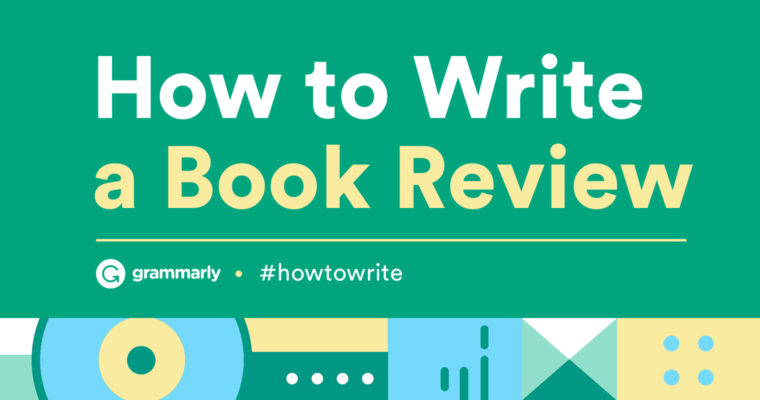How To Write a Book Review
How To Write a Book Review

Are you an avid bookworm who loves to share what you thought of your latest read? Writing a book review is a great way to let fellow readers know about an exciting new page-turner—or give a heads up that a book might not meet expectations.
Whether you’re reviewing a book on a site like Goodreads or on your personal blog, you’ll want your review to be informative and helpful for your audience. Read on for our essential tips on how to write an engaging book review.Here’s a tip: Want to make sure your writing always looks great? Grammarly can save you from misspellings, grammatical and punctuation mistakes, and other writing issues on all your favorite websites.Your writing, at its best.Be the best writer in the office.GET GRAMMARLY
What to Include
Love templates? Here’s what to include in your book review:
- A Hook
- Essential Book Information
- Basic Plot Summary
- Your Praise and Critique
- Your Recommendation
- Your Rating
A Hook
A “hook” is a line that catches your audience’s attention and piques their interest so they’ll continue reading your review instead of scrolling past it.
Your hook could be a compelling or provocative statement:Margaret Atwood’s subversive brilliance shines in new and unexpected ways with this masterpiece.
Or even a question:Ever wondered what the lovechild of Twilight and The Hitchhiker’s Guide to the Galaxy would look like?
Essential Book Information
Share any general information about the book that is important for readers to know. The title and author are an obvious choice. The year the book was published may be relevant if it came out 10+ years ago. Be sure to mention if the book is part of a series and whether it’s necessary to have read other books in the series before this book.
Basic Plot Summary
Share a high-level synopsis of the plot so your audience gets the gist of what the story is about. Best practice is to leave out the climax or ending of the book and avoid giving away spoilers so you don’t ruin the story for your audience.
It’s always better to err on the side of caution and say a plot has an “unexpected twist” rather than revealing “the villain is the protagonist’s father!” If you must include a spoiler, some review sites will let you hide spoiler sentences, so your audience can choose whether they want to read it or not.
Sites like Goodreads also include a short synopsis or teaser on the book’s web page, so providing an outline may sometimes be unnecessary. Use your best judgment on whether sharing a synopsis will benefit your review.
Your Praise and Critique
This section is the most important part of your review and should be the longest. Anyone can summarize a plot, but what is your unique take on this book?
Simply saying a book was “good” or “bad”, or that you liked it or didn’t, isn’t helpful. Let your audience know why you think it’s a great read, or why you found it disappointing. Sharing these details will help your audience form their own opinion of whether they would enjoy reading the book. For example:The vivid language instantly transported me into the world, but there were several huge plot holes that didn’t make sense.I personally didn’t care for the protagonist; the snarky anti-hero schtick got old after a while.The writing was rough, with especially awkward dialogue, but I thought the premise of the story was brilliant.
Your Recommendation
After sharing your praise and critique, let your audience know your conclusions. Who do you think would enjoy this book?
Did you personally dislike it because of the time travel paradoxes, but think that folks who like a good space opera would have fun with it?
Is this the 16th book in a series that was starting to grow stale, and you were pleasantly surprised by some new characters?
Your Rating
Most review sites provide a star rating system. Let your audience know your rationale for choosing a particular rating.
If you’re reviewing a book on your personal blog and using your own rating system, be sure to explain this as well.
General Tips for Writing a Book Review
- Keep it Streamlined: Pay attention to length and make every word count. Lengthy, rambling reviews are confusing and time-consuming to read. Keep your readers with you by getting to the point.
- Remember to Proofread: Make sure your spelling and grammar are on point. A review riddled with errors is confusing to read and may not be taken seriously.
- Don’t Be Mean: Remember that you’re reviewing a book that another human poured their heart and soul into to write. Express your honest opinion, but don’t be nasty about it. Imagine if it were your book being reviewed, how would you want a reader to express their critique?
What are your favorite tips for writing a great book review?
We still want to hear from you! Let us know what you want to know how to write!
Our Advantages
Quality Work
Unlimited Revisions
Affordable Pricing
24/7 Support
Fast Delivery